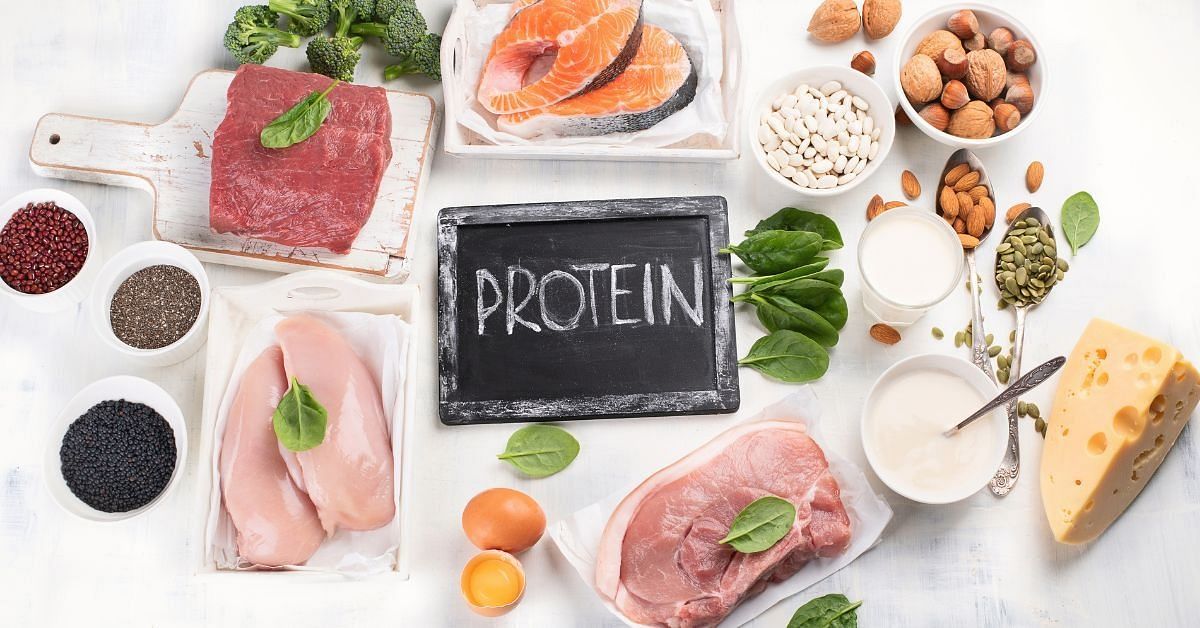Protein Foods for Bodybuilding: 14 Top Recommended Foods By Experts!
Looking for guidance on protein and ways to shape your diet? If you want to know what to consume, check out our list of the best protein foods for bodybuilding.

Lifting weights and consuming protein go hand in hand—or, more accurately, hand on a shaker bottle. However, as beneficial as protein powders are, they should not be your sole source of protein! To get a full range of amino acids and nutrients, you must eat a protein-rich diet.
If you want to increase your protein intake with the best protein sources for weight loss and muscle building, here's your complete high-protein food list—plus simple recipe ideas to help you put it into action! Each one is high in protein and low in carbohydrates, so you can enjoy them without jeopardising your progress.
Meat-based Protein Sources
While advances in food technology have created some new sources of high-quality protein, animal proteins remain the foundation of the classic bodybuilder diet focused on muscle gain. There could be a good reason for this: studies show that animal protein has a greater anabolic effect on the body than plant protein. This means that when compared to plant-based protein sources, animal proteins may be more effective at promoting muscle growth. However, as we'll see in the following section, plant protein has some distinct advantages.
1. Chicken Breast
Chicken breast is a traditional bodybuilding diet staple. Bodybuilders have been consuming large amounts of chicken breast for decades, whether bulking or cutting. It's reasonably priced, versatile, and convenient for bulk cooking - the practice of preparing a large number of meals to be eaten later. Chicken breast provides a good amount of protein for a low-calorie count because it is a lean protein source. A typical 4oz serving of unseasoned chicken breast contains anywhere from 20 to 24 grammes of protein and 110 to 140 calories.
2. Turkey Breast
Turkey breast, like chicken, is an excellent source of lean protein. It can also be served and prepared in a variety of ways, making it ideal for bulk cooking. Certain types of turkey breast may contain a high level of sodium and nitrates, so choose meat products made with natural ingredients and as little filler as possible.
3. Tuna
Tuna is another classic bodybuilder food and one of the most common forms of animal protein. Canned tuna is available in almost every grocery store, but premium tuna steak cuts are also available. Because of the mercury content of tuna, certain people, such as children and pregnant or nursing women, should limit their consumption.
4. Salmon
Salmon is another high-protein fish that can help you build muscle, but it is typically more expensive than tuna products. Salmon is also high in Omega-3 fatty acids, which are good for your heart and may even lower your risk of certain types of cancer.
Plant Based Protein Sources
Although animal products have a slight advantage in terms of muscle building, it is possible to gain muscle mass without consuming animal meats. Furthermore, new research suggests that animal protein sources may help reduce the risk of heart disease and other cardiovascular conditions.
As a result, many people who want to build muscle will choose to avoid or reduce their intake of animal protein sources. If you don't want to eat a lot of meat in your diet, there are plenty of plant-based alternatives.
1. Pea Protein
Pea protein powder is derived from yellow split peas and contains no dairy. Pea protein is often the protein source of choice for those with dairy allergies because it is naturally gluten-free and hypoallergenic (free of common allergens).
While pea protein does not digest as slowly as casein, another type of dairy protein, it is absorbed more slowly than whey proteins. That is why pea protein is an excellent choice for post-workout recovery, especially for those who are allergic to whey. Many people find it more satiating than whey or other types of protein.
2. Soy Protein
Soy is a popular plant-based protein source because it is one of the complete protein sources found only in animals. Recent research also shows that there is no difference in muscle building between soy and whey protein. Soy protein, like pea protein, can be an excellent alternative for those who are allergic to whey or dairy.
3. Mycoprotein
Mycoprotein is a protein alternative derived from the naturally occurring fungus Fusarium venenatum. It has a meaty texture and a high protein and fibre content while being low in fat and cholesterol. Mycoproteins are versatile in meals and work well in place of animal meats such as chicken.
4. Lentils
Lentils, a type of legume, were among the first foods eaten by humans. They are also a popular source of non-meat protein. The most common types of lentils available in the West are labelled by colour: green, brown, black, yellow, red, and orange. Lentils are an excellent source of healthy carbohydrates, which are an important source of energy. Green lentils, in particular, contain a high concentration of antioxidants that can help the body fight disease, such as polyphenol.
5. Quinoa
Quinoa is another non-meat protein source that has grown in popularity in recent years among bodybuilders and others looking for a high-protein source. Quinoa contains more amino acids than other cereal grains, according to nutritional analysis.
6. Brown Rice
Brown rice is another bodybuilding staple that most muscle builders are familiar with. One nutritional study of college-aged men found no difference between whey protein and rice protein isolate in terms of recovery, soreness, or muscle growth. Brown rice is an excellent side dish or base for combining various types of meat and vegetables.
7. Dairy Products
In the world of nutrition, dairy products are a mixed bag. Many people avoid dairy products because some research suggests a link between dairy consumption and an increased risk of heart disease. Other research suggests that consuming more milk, cheese, and yoghurt is not associated with an increased risk of death. Some studies even suggest that eating fermented dairy products may reduce your risk of heart disease.
It's especially important to look for natural and minimally processed dairy products when shopping. It's also a good idea to choose fermented dairy products like cheese or yoghurt because the healthy fats in these foods have been shown to improve blood lipid levels.
8. Egg Whites
Egg whites are a liquid dairy product that has had the yolk removed to reduce saturated fat and cholesterol. Egg whites are a low-calorie dairy product that has the flavour and texture of whole eggs. Egg whites can also serve as a base for a post-workout protein shake or smoothie.
9. Greek Yoghurt
Greek yoghurt is one of the healthiest dairy products available. According to the University of Tennessee Medical Center, greek yoghurt has fewer carbs and roughly twice the protein of regular yoghurt, making it ideal for those putting together a weight loss diet that prioritises protein while limiting carbs. It's also easier on the digestive system because it contains less lactose than regular yoghurt. Greek yoghurt can be easily mixed or flavoured with ingredients such as peanut butter, mixed nuts, chia seeds, and other foods.
10. Cottage Cheese
Cottage cheese, another bodybuilder classic, is experiencing a renaissance as consumers seek out healthier dairy options. According to scientific evidence, regular cheese contains seven times the fat of cottage cheese, making it an excellent choice for a low-fat diet. Cottage cheese also contains essential amino acids like leucine, which are necessary for the body to build muscle tissue. When consumed shortly before going to bed, cottage cheese can be just as beneficial to muscle building and health as whey.
Takeaway
You should not consider this list to be an exhaustive list of foods. Allow it to inspire you to create a customised meal plan that meets all of your macronutrient targets while also fitting in with your taste preferences and lifestyle.
It is not necessary to be a bodybuilder to eat like one. Given enough time, anyone can change their body composition with the right information, a resistance training programme, and a commitment to consuming the right amount of protein foods that promote muscle protein synthesis in the body. Whether you want to compete on stage or simply lose some body fat, bodybuilder diet tips can inspire you to create an eating plan that allows you to be the best version of yourself.
References
Peter Clarys, January 2014; Comparison of Nutritional Quality of the Vegan, Vegetarian, Semi-Vegetarian, Pesco-Vegetarian and Omnivorous Diet - https://www.mdpi.com/2072-6643/6/3/1318/htm
Position of the American Dietetic Association: Nutrient Supplementation, December 2009 - https://www.jandonline.org/article/S0002-8223(09)01696-4/fulltext
Vesanto Melina, December 2016; Position of the Academy of Nutrition and Dietetics: Vegetarian Diets - https://pubmed.ncbi.nlm.nih.gov/27886704/
David Rogerson, 2017; Vegan diets: practical advice for athletes and exercisers - https://www.ncbi.nlm.nih.gov/pmc/articles/PMC5598028/
What is a complete protein? - https://www.piedmont.org/living-better/what-is-a-complete-protein

